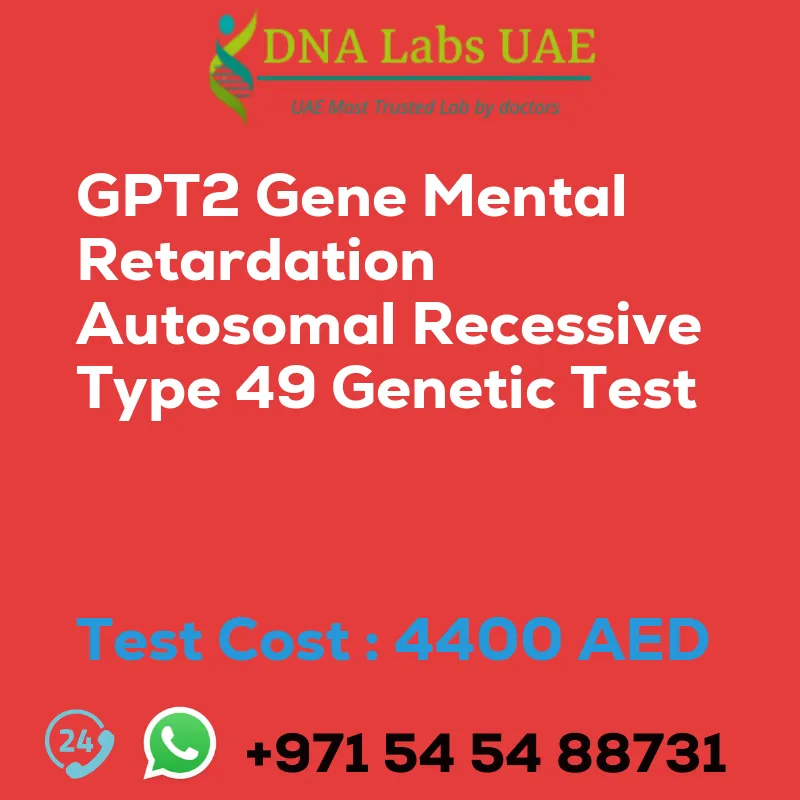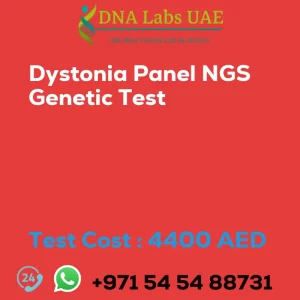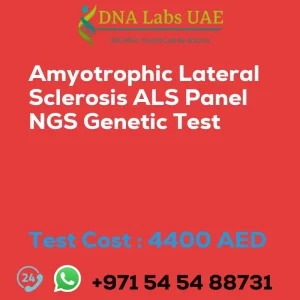GPT2 Gene Mental Retardation Autosomal Recessive Type 49 Genetic Test
Components
Price: 4400.0 AED
Sample Condition
Blood or Extracted DNA or One drop Blood on FTA Card
Report Delivery
3 to 4 Weeks
Method
NGS Technology
Test Type
Neurological Disorders
Doctor
Neurologist
Test Department
Genetics
Pre Test Information
Clinical History of Patient who is going for GPT2 Gene Mental retardation, autosomal recessive type 49 NGS Genetic DNA Test
A Genetic Counselling session to draw a pedigree chart of family members affected with GPT2 Gene Mental retardation, autosomal recessive type 49
Test Details
NGS Genetic Test for Mental Retardation, Autosomal Recessive Type 49
NGS (Next-Generation Sequencing) genetic testing is a powerful tool used to identify genetic variations and mutations associated with various conditions, including mental retardation.
In the case of Mental Retardation, Autosomal Recessive Type 49, NGS testing can be utilized to detect specific gene mutations responsible for this condition.
To perform the NGS genetic test for Mental Retardation, Autosomal Recessive Type 49, the following steps are typically followed:
- Sample Collection: A biological sample, usually blood or saliva, is collected from the individual undergoing testing. The sample contains the DNA necessary for genetic analysis.
- DNA Extraction: The DNA is extracted from the collected sample using specialized laboratory techniques. This ensures that the genetic material is isolated and purified for further analysis.
- Library Preparation: The extracted DNA is fragmented and specific adapters are added to the fragments. These adapters allow the DNA fragments to be amplified and sequenced.
- Sequencing: The prepared DNA library is loaded onto a sequencing instrument, such as an Illumina sequencer. The instrument performs high-throughput sequencing, generating millions of short DNA reads.
- Data Analysis: The raw sequencing data is processed and analyzed using specialized bioinformatics tools and algorithms. The goal is to align the DNA reads to a reference genome and identify genetic variations, including mutations associated with Mental Retardation, Autosomal Recessive Type 49.
- Variant Interpretation: The identified genetic variations are then interpreted by geneticists and clinicians. Variants that are known to be associated with Mental Retardation, Autosomal Recessive Type 49 are considered pathogenic or likely pathogenic.
- Genetic Counseling and Reporting: Once the analysis is complete, a comprehensive report is generated, summarizing the findings. This report is typically provided to the healthcare provider or genetic counselor, who can then discuss the results with the individual or their family.
NGS genetic testing for Mental Retardation, Autosomal Recessive Type 49 can help in diagnosing the condition, providing valuable information for treatment and management strategies, and facilitating genetic counseling for affected individuals and their families.
It is important to consult with a healthcare professional or genetic counselor to understand the implications of the test results and to make informed decisions regarding further medical care.
| Test Name | GPT2 Gene Mental retardation autosomal recessive type 49 Genetic Test |
|---|---|
| Components | |
| Price | 4400.0 AED |
| Sample Condition | Blood or Extracted DNA or One drop Blood on FTA Card o |
| Report Delivery | 3 to 4 Weeks |
| Method | NGS Technology |
| Test type | Neurological Disorders |
| Doctor | Neurologist |
| Test Department: | Genetics |
| Pre Test Information | Clinical History of Patient who is going for GPT2 Gene Mental retardation, autosomal recessive type 49 NGS Genetic DNA Test A Genetic Counselling session to draw a pedigree chart of family members affected with GPT2 Gene Mental retardation, autosomal recessive type 49 |
| Test Details |
NGS Genetic Test for Mental Retardation, Autosomal Recessive Type 49 NGS (Next-Generation Sequencing) genetic testing is a powerful tool used to identify genetic variations and mutations associated with various conditions, including mental retardation. In the case of Mental Retardation, Autosomal Recessive Type 49, NGS testing can be utilized to detect specific gene mutations responsible for this condition. To perform the NGS genetic test for Mental Retardation, Autosomal Recessive Type 49, the following steps are typically followed: 1. Sample Collection: A biological sample, usually blood or saliva, is collected from the individual undergoing testing. The sample contains the DNA necessary for genetic analysis. 2. DNA Extraction: The DNA is extracted from the collected sample using specialized laboratory techniques. This ensures that the genetic material is isolated and purified for further analysis. 3. Library Preparation: The extracted DNA is fragmented and specific adapters are added to the fragments. These adapters allow the DNA fragments to be amplified and sequenced. 4. Sequencing: The prepared DNA library is loaded onto a sequencing instrument, such as an Illumina sequencer. The instrument performs high-throughput sequencing, generating millions of short DNA reads. 5. Data Analysis: The raw sequencing data is processed and analyzed using specialized bioinformatics tools and algorithms. The goal is to align the DNA reads to a reference genome and identify genetic variations, including mutations associated with Mental Retardation, Autosomal Recessive Type 49. 6. Variant Interpretation: The identified genetic variations are then interpreted by geneticists and clinicians. Variants that are known to be associated with Mental Retardation, Autosomal Recessive Type 49 are considered pathogenic or likely pathogenic. 7. Genetic Counseling and Reporting: Once the analysis is complete, a comprehensive report is generated, summarizing the findings. This report is typically provided to the healthcare provider or genetic counselor, who can then discuss the results with the individual or their family. NGS genetic testing for Mental Retardation, Autosomal Recessive Type 49 can help in diagnosing the condition, providing valuable information for treatment and management strategies, and facilitating genetic counseling for affected individuals and their families. It is important to consult with a healthcare professional or genetic counselor to understand the implications of the test results and to make informed decisions regarding further medical care. |







